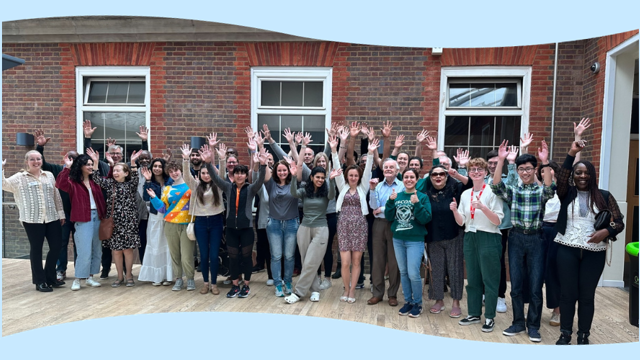Back in 2020, Westminster’s £37 billion Test and Trace system was in a high stakes race to stop the spread of new Covid-19 variants and more regional lockdowns. The problem was, it was only reaching 60% of people nationwide.
In the north west of England, however, a low-tech version of the scheme run by Blackburn Council was engaging 80% of locals.
How and why did their approach work? What lessons can we learn about delivering services at a local level, to get better results? And how can these lessons help us multiply the impact and value of our public services, so we can better tackle the global challenges increasingly shaping our everyday lives?
Hyper-local is a multiplier
A hyper-local approach focuses on understanding and tailoring services around the needs that people have within a specific place or situation.
Rather than applying a one size fits all service template, it relies on the use of local networks and knowledge to deliver on national policy, tailoring approaches to individual circumstances and local contexts, and thereby improving outcomes.
A hyper-local strategy allows public services to punch higher, to deliver more value and impact than the sum of their parts. In this sense, it’s a multiplier.
Local connections fire up national systems
Blackburn Council’s contact tracing scheme is a great example of this multiplying, hyper-local approach. The Council used its local knowledge to track people that the national Test and Trace service couldn’t reach, often sending officers directly to people’s homes to speak to them about their recent contacts in order to limit the spread of the virus.
Similarly during the pandemic, local vaccination buses were used in places marked by health and social inequalities, and where uptake of the vaccine was low. These travelling health engagement centres used local insights, volunteers and networks to get buy-in from local communities and boost vaccination numbers.
It’s important to note, however, that this local success wouldn’t have been possible without the support of a national system providing the right data, medical equipment and training. And that’s the key to a successful hyper-local approach. Public services can have more impact by connecting national policy with the local networks where people access services and support. And when local people help deliver front line services, those services are trusted more by local communities.
How to adopt a hyper-local approach
1) Increase citizen engagement and shared responsibilities
Putting citizens’ lived experience at the heart of change increases social cohesion and ambition for how things can be improved. It helps service providers to generate new ideas and also creates a shared sense of ownership between authorities and community members for solutions.
A great example is our work with Blackpool Council to set up a Climate Assembly of local residents. This group — made up of people from different demographics in the town — deliberated on what could be done to tackle climate issues locally. Their recommendations were then fed into the council’s ongoing action plan.
For many, this was the first time they’d engaged in political activity, but they’re already vowing it won’t be the last.
2) Invest in early local participation
Early outreach is much more likely to lead to successful, longer term engagement as solutions are embedded within local communities right from the outset.
Whether it’s investing in local ideas or in places that bring people together like libraries, sports clubs and community hubs, early local collaboration can help the public sector achieve more, even when resources are scarce.
3) Focus on lived experiences, to avoid assumption based service delivery
Putting lived experience and voices at the centre of policy, organisational structures and decision making leads to better outcomes. It isn’t always easy, but it’s far more cost effective than inaccurate, assumption based service delivery which may need to be redone again and again.
We’ve been putting this principle into action by working with local communities throughout the UK to shine a light on their local priorities. Take for example the Towns Fund — a £3.6 billion central government investment designed to level up towns nationwide — where success depends on funds being user-led, rather than policy-led.
From the regeneration of high streets to investment in local skills, our workshops and learning programmes have helped towns develop their business cases to secure the right funding for their specific needs.
Building on local links to start new conversations
These lessons are even more vital now, as every public institution in every town and city across the UK is facing tough decisions. How to “build back better” from a global pandemic; how to tackle a global climate emergency; and how to deal with the cost of living crisis, not to mention their own specific local challenges.
But policymakers and leaders can now build on the strong local links that were created during the pandemic. In a world where resources are stretched, unlocking the potential of local communities with a hyper-local approach can help us all do more, with greater and lasting impact.
You can find out more about how seeking local communities’ time, ideas, and direct engagement can boost positive change in our new book Multiplied, available to buy from Amazon and Waterstones.
Multiplied explores how embracing modern ways of working and unlocking the combined potential of technology, data and design can multiply the impact and scale of the public sector’s work.
All profits from the book are being donated to the Association of NHS Charities.

Introducing Multiplied - a new book about public sector digital transformation
Multiplied focuses on how we can unlock more of the potential of technology, data and design in the public sector, while also working more closely with communities.
Read moreOur recent insights
Transformation is for everyone. We love sharing our thoughts, approaches, learning and research all gained from the work we do.

Empowering communities: the impact of citizens' assemblies
We spoke to Ellen Jennings, Senior Workstream Coordinator at Barnet Council’s Sustainability Team, about the importance of citizens' assemblies in helping to address the climate emergency.
Read more
Bringing community power to life
Our Community & Political Engagement Director, Claire Hazelgrove, shares her experiences from Stronger Things
Read more
Championing community power at Stronger Things 2022
We’re pleased to showcase the benefits of community engagement as headline sponsor of this year’s New Local event.
Read more

